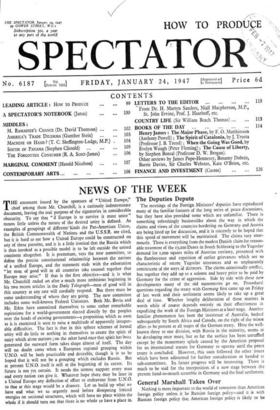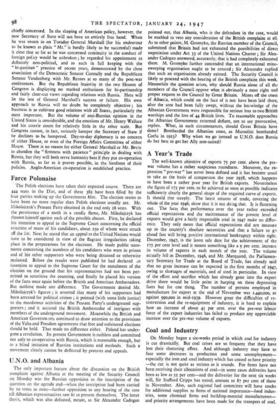General Marshall Takes Over
Nothing is more important to the world of tomorrow than American foreign policy unless it be Russian foreign policy—and it is with Russian foreign policy that American foreign policy is likely to be
chiefly concerned. In the shaping of American policy, however, the new Secretary of State will not have an entirely free hand. When he was sworn in on Tuesday General Marshall (for his endeavour to be known as plain " Mr." is hardly likely to be successful) made it clear that so far as he was concerned continuity in the conduct of foreign policy would be unbroken ; he regarded his appointment as definitely non-political, and as such in full keeping with the " bi-partisan " practice of recent years, demonstrated by the close association of the Democratic Senator Connally and the Republican Senator Vandenberg with Mr. Byrnes at so many of the post-war conferences. But the Republican inajority in the two Houses of Congress is displaying no marked enthusiasm for bi-partisanship and fairly clear-cut views regarding relations with Russia. Here will lie the test of General Marshall's success or failure. His own approach to Russia will no doubt be completely objective ; his business is to cultivate good relations with all States, particularly the most important. But the volume of anti-Russian opinion in the United States is considerable, and the emotions of Mr. Henry Wallace and his coterie count for relatively little in the other scale. But Congress cannot, in fact, seriously hamper the Secretary of State if he declines to be hampered. Day-to-day diplomacy is no concern of either House, or even of the Foreign Affairs Committee of either House. There is no reason for either General Marshall or Mr. Bevin to abandon the " firmness with patience " principle in dealing with Russia, but they will both serve humanity best if they put co-operation with Russia, so far as it proves possible, in the forefront of their policies. Anglo-American co-operation is established practice.



































